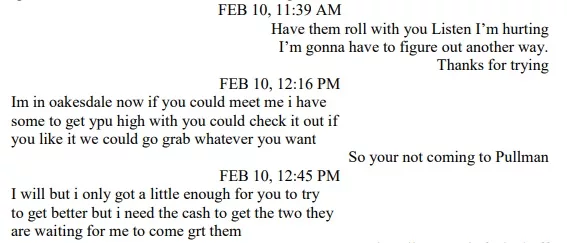
SPOKANE, WA – A 59-year-old man who claimed a Whitman County Sheriff’s Deputy entrapped him by using a fictitious social media persona to arrest him for Possession of a Controlled Substance (Methamphetamine) With Intent to Deliver has lost his appeal through the Washington State Court of Appeals Division III.
William Patrick McBride, who has a long criminal history, intended to provide the methamphetamine to “Pauline Niner,” according to the Court. That person turned out to be a fictitious account created as part of a sting operation by the sheriff’s office. In his appeal, McBridge contended he should have been acquitted on the basis of his defense of entrapment and, for the first time on appeal, that the conduct of law enforcement was outrageous, in violation of his right to due process.
“He fails to make the required showings, however. For that reason and because he presents no meritorious issues in his pro se statement of additional grounds, we affirm,” the Court ruled today.
In January 2022, a sheriff’s sergeant relied on his recent training to create a Facebook profile for “Pauline Niner,” for the purpose of meeting people online who are willing to sell drugs, according to the court document, the document says. The Facebook profile characterized her as a woman living in Pullman.
“At Mr. McBride’s trial, the sergeant explained that he set up a female profile because “[i]t attracts more people. More—more guys are out looking for girls and girls are—looking to—more guys sell drugs than girls,” the ruling says.
In 12 days’ of communications that took place over two and one-half weeks in early 2022, McBride reportedly contacted “Pauline” and the two discussed meeting up.
“Pauline” wanted to procure methamphetamine and Mr. McBride said he could obtain some for her. Problems with Mr. McBride’s vehicle, his suppliers, and his cash flow proved to be obstacles to his attempts to provide her with methamphetamine on February 9 and 10, and again on the evening of February 15, but on February 16 he informed “Pauline” he had a “little bit” to bring to her,” the Court reports.
Present to meet McBride when he arrived at “Pauline’s” address was the sergeant, who arrested him.
The Court wrote in its decision that at trial, McBridge asserted the defense of entrapment.
“His lawyer likened Sgt. Jordan’s sting to a Cold War, KGB “honey trap”: using fictitious females to seduce men into doing something wrong. Defense counsel also argued that on the day of his arrest, Mr. McBride had merely intended to share the small amount of methamphetamine in his possession with “Pauline,” which was not the statutorily-required “delivery,” the Court wrote.
The only witnesses called in the State’s case were the sergeant and a witness from the Washington State Patrol Crime Laboratory.
“The crime lab witness had tested the substance seized from Mr. McBride and testified that it was 0.4 grams of crystalline material that contained methamphetamine. Mr. McBride did not testify,” according to the Court. “The most critical evidence at trial was exhibit 101, a complete collection of screenshots that [the] Sgt. had taken of “Pauline’s” and Mr. McBride’s communications on Facebook Messenger. Apart from that, the two had only had one brief telephone conversation.”
The jury returned a guilty verdict.
“Defense counsel later stated at sentencing that it had taken the jurors almost two and one-half hours to return the guilty verdict on a single count, which suggested they were troubled by the issues of entrapment and whether there had been a delivery, the Court wrote. “He asked for a sentence at the bottom of the range, but the court imposed a midrange sentence of 90 months total confinement, with 12 months of community custody.”
McBride appealed, claiming (from the Court of Appeals decision):
I. THE EVIDENCE WAS SUFFICIENT TO PRESENT A JURY QUESTION ON THE ENTRAPMENT DEFENSE
The jury had a sufficient basis for concluding that Mr. McBride was not tricked into committing a crime he would not otherwise have committed. Early in his communications with “Pauline,” Mr. McBride said not only that he could get as much methamphetamine as he wanted but “don[’]t know anyone to sell to”; he also suggested that she and he embark on a joint enterprise. See Ex. 101, at 3 (speaking of “work[ing] out an arrangment [sic] that works for both of us,” id. at 4, talking about “maybe working together,” id. at 5, and stating, “im [sic] wanting to do something with you . . . if your [sic] interested,” id. at 10). At least two attempts by Mr. McBride to acquire methamphetamine for resale to “Pauline” failed not because of any reluctance on his part but because people were out of town, or he was cash-strapped, or he had car trouble. At no point in their communications did he express any reservation about selling drugs to her.
II. OUTRAGEOUS GOVERNMENT CONDUCT IS NOT SHOWN
Mr. McBride repeatedly failed to deliver the amount of methamphetamine “Pauline” was seeking, at the times she was seeking it. The amount and timing of the eventual delivery was controlled by Mr. McBride. Mr. McBride implies on appeal that he was targeted by Sgt. Jordan, but he presented no such evidence and any evidence that he was a known or suspected drug dealer would cut against him in the due process analysis. At most, Mr. McBride can point to only the fact that he was arrested in a law enforcement sting operation, in which he failed to prove entrapment. This falls well short of outrageous government conduct.

